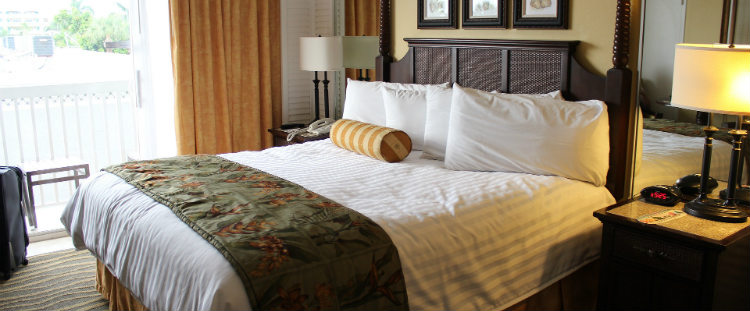Banquet servers in Pennsylvania have filed a lawsuit against their employer, Hyatt Hotels, accusing the global hospitality giant of minimum wage and overtime violations.
Philly Hyatt Accused Of Wage & Hour Violations
In her complaint, a former banquet server at Philadelphia’s Hyatt at the Bellevue says the hotel company established a complex pay policy that deprived servers of their earned gratuities, while also refusing to pay overtime wages. Nancy Livi worked at the Bellevue for nearly thirty years, spending her time serving food and drinks to private parties, like wedding receptions, that rented out the hotel’s banquet facilities.

Throughout her tenure with the company, Hyatt charged its private event clients a “gratuity fee” or “service charge” – usually 21% of the event’s total cost. Some of this percentage charge went to servers as a tip, the lawsuit explains, but Hyatt kept a significant portion of the “gratuity” for itself. In fact, the company wouldn’t even tell servers how much it was collecting in “service charges,” Livi says.
Tips Can’t Go To Untipped Workers – Or Companies
Tips, as the Department of Labor has repeatedly pointed out, are solely for tipped employees, like banquet servers. It would be a violation of federal law for an employer to keep any of the gratuities intended for waitstaff. But that’s exactly what Nancy Livi accuses Hyatt Hotels of doing. Troublingly, she claims that this is the company’s pay policy throughout Pennsylvania – in no less than eleven individual hotels.
Tipped Wages Must Be Factored Into Overtime
More importantly, the employer fails to take the tips that banquet servers receive into consideration when calculating their overtime wages, the complaint alleges. “As a result,” court documents continue, “banquet staff employees are underpaid for overtime because their time-and-half pay rate is based on an hourly rate that is lower than it should be under [Labor Department] regulations.”
It should go without saying that tipped employees, who are almost always entitled to overtime pay, deserve an overtime wage that factors in both their hourly cash wage and their hourly tip earnings. Some employers, however, aren’t respecting their workers’ rights. Whether these wage and hour violations are intentional or not isn’t important. Wage theft is always illegal, no matter the purpose behind it.
“Systematic & Intentional” Wage Theft, Class Action Says
Hyatt Hotels currently operates 679 properties, including hotels and resorts, in 54 countries, according to a recent press release from the company. “Despite Hyatt’s global footprint,” Livi writes, “the Hyatt locations that are owned and operated […] in Pennsylvania have systematically and intentionally ignored the requirements of applicable federal and state laws.”
The Hyatt overtime complaint was filed on September 29, 2015 in the US District Court for the Eastern District of Pennsylvania. Logged as case number 2:15-cv-05371-AB, the lawsuit remains pending and is currently seeking certification as a class action.
Wage Theft Threatens Food Service Workers
Servers across the country are extremely vulnerable to wage theft. In fact, food service and hospitality positions have become a focal point for the fight against wage and hour violations, where the prevalence of tipped workers makes complying with federal and state regulations particularly complex.
The Fair Labor Standards is a federal law that governs minimum wage and overtime requirements for most of America’s workers. The law defines a tipped employee as any worker who customarily and regularly receives an average of $30 or more in tipped compensation a month. Having tipped employees changes things for employers – especially where the minimum wage is concerned. When an employee routinely makes tips, their employer can take something called a “tip credit,” effectively subtracting the worker’s hourly tip rate from the minimum wage. That means the employee’s cash wage, what the company actually pays to the worker, can be less than the minimum wage, but remain legal.
How To Calculate A Proper Tip Credit
Here’s an example to clarify the concept.
Jeff works as a server at a restaurant, accepting tips as a portion of his compensation. He works in New Hampshire, where the state minimum wage is the same as the federal rate: $7.25 per hour.
1. Calculate Average Hourly Tips
Let’s keep the example simple for now and say that, in one week, Jeff makes $30 in tips – the minimum amount that makes him a tipped employee. To properly calculate a tip credit for Jeff’s employer, we have to average his weekly tips over the amount of hours he worked. Let’s say Jeff worked 40 hours in the week. $30 divided by forty hours is equal to $0.75 per hour in tips.
2. Subtract Hourly Tips From Minimum Wage
Now, Jeff’s employer can take the tip credit, subtracting that $0.75 per hour in tips from the $7.25 minimum cash wage that is legally required. As a result, Jeff should be paid an hourly wage, in addition to the tips he made, of $6.75 per hour.
Now, if Jeff makes more in tips one week, his employer can subtract more from the minimum wage – but there’s a limit. According to federal law, a tip credit can’t fall below $5.12 and, likewise, the cash wage paid to a tipped employee can’t fall below $2.13. These two numbers, tip credit and cash wage, always have to add up to at least the applicable minimum wage. Where a state minimum wage is higher than the federal minimum wage, workers are entitled to the higher rate.
